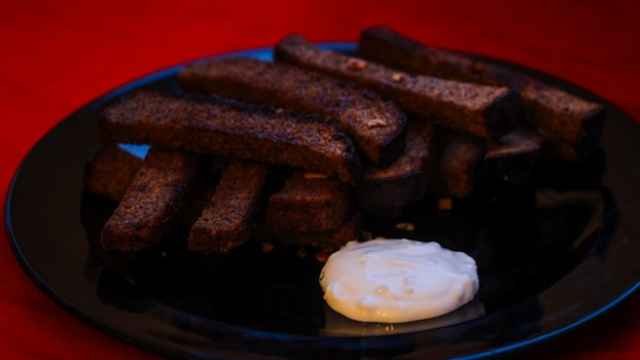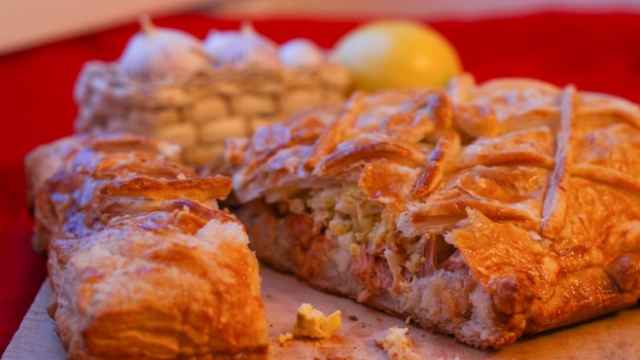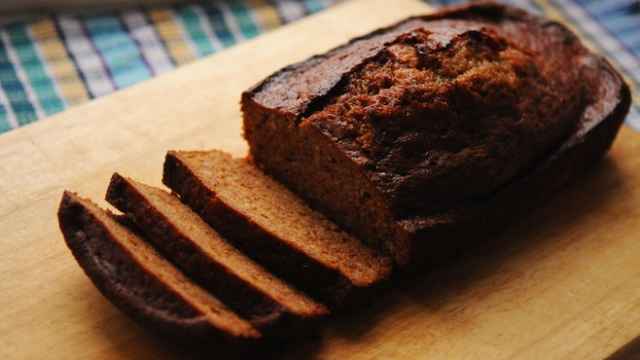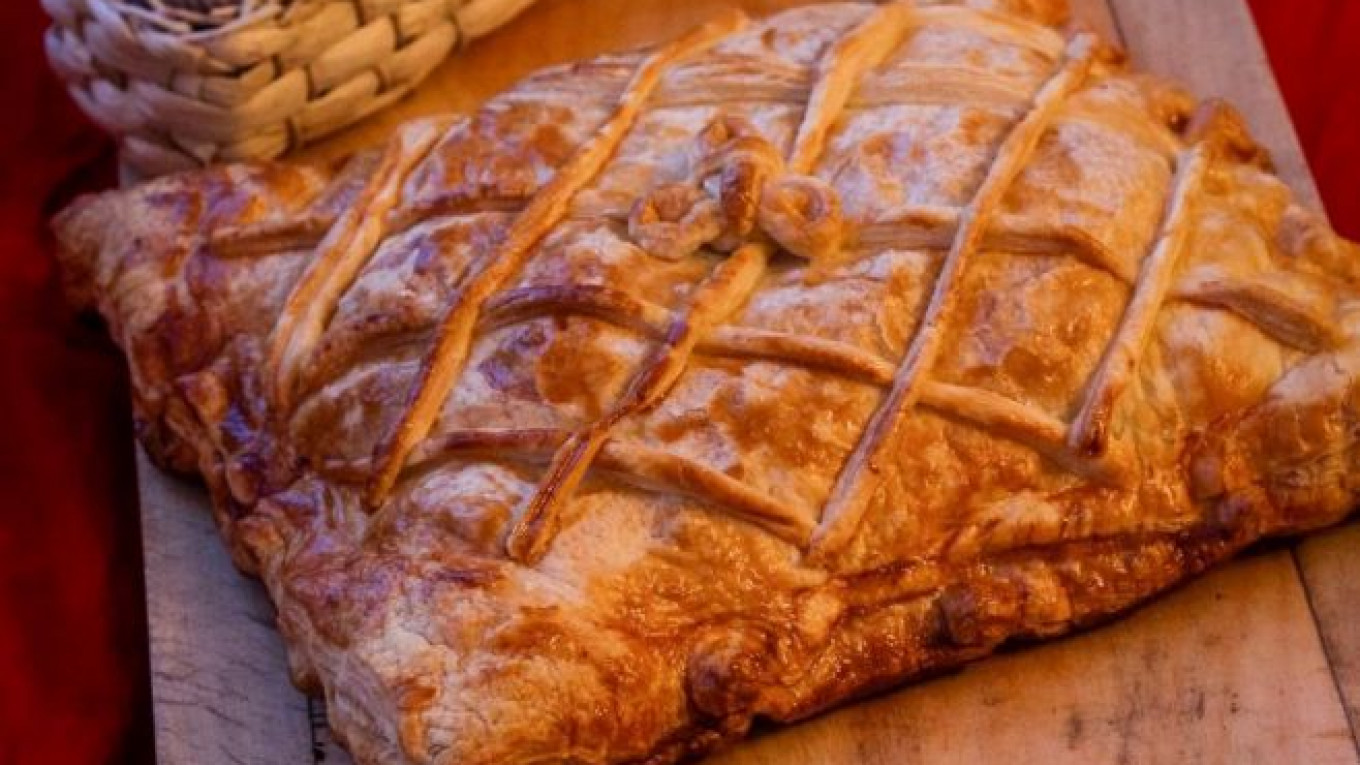The rapid devaluation of the ruble means more people are having to postpone expensive holidays abroad in favor of entertaining at home. But the dreary economic forecast shouldn't mean foregoing Christmas entirely—quite the contrary: Russians are famous for their lavish dinner parties.
We've lined up a five-course Christmas dinner with a Russian twist — all recipes serve four, are easy to make (nothing more fancy required than a whisk), and, not unimportant: they're easy on your ruble-stashed wallet.
THE MENU
Garlic Toasts (???€?µ?????? ?? ?‡?µ????????????)
Blini with Caviar and Sour Cream (?±?»?????‹ ?? ?????€???? ?? ?????µ?‚?°??????)
Salmon Coulibiac (?????»?µ?±?????° ?? ?»?????????µ??)
Honey Cake (???µ???????‹?? ???µ????)
Sbiten (???±???‚?µ????)
APPETIZERS
Garlic Toasts (???€?µ?????? ?? ?‡?µ????????????)
Garlic toast, or grenki, are classic Russian bar food: cheap, filling, and good with beer. Many families also like to make these toasts at home as a way of using up stale slices of Borodinsky bread. If beer is not on the Christmas menu, you might like to try these as appetizers with your Christmas cocktails, or with wine or champagne, as you see fit.

Ingredients:
1 small Borodinsky bread loaf
4-6 tbsp vegetable oil
2 cloves garlic, chopped finely
For the sauce:
¼ cup (60g) sour cream
¼ cup (60g) mayonnaise
1 clove garlic, chopped finely
Pinch of salt
1. Preheat the oven to around 300°F (150°C).
2. Make 5 thick slices of bread, then cut each slice into long strips and place in a large bowl. Put the garlic in the bowl and add enough oil to coat the bread without making it soggy.
3. Lay the unbaked garlic toasts onto a baking tray, while making sure they don't overlap. Bake them in the oven for around 10 minutes, stirring after about 5 minutes.
4. While the toasts are in the oven, mix together the ingredients for your sauce: sour cream, mayonnaise, garlic and salt.
Blini with Caviar and Sour Cream (?±?»?????‹ ?? ?????€???? ?? ?????µ?‚?°??????)
There is nothing more Russian than blini. With only slight modifications, these classic Russian pancakes are the perfect addition to every meal: at breakfast try adding sweet toppings, such as honey, jam, or condensed milk, and for lunch or dinner you might try adding savory caviar, as suggested here.

Ingredients:
2 cups (475ml) milk
2 eggs
pinch of salt
1 tbsp sugar
¼ tsp baking soda
2 cups (250g) flour
2 tbsp vegetable oil
½ cup (120ml) boiling water
¼ cup (70g) butter
1. Beat together the milk and eggs with a strong whisk. Stir in the salt and sugar, then add the baking soda. Mix well. Slowly stir in the flour, then add the vegetable oil.
2. Slowly add the boiling water until you have a very runny batter, then set aside for around 20 minutes.
3. Put a pat of butter in a small frying pan and heat the pan over medium heat. You'll know the pan is hot enough when the butter starts to sizzle slightly. Pour one ladle of batter into the pan and tilt until the batter coats the bottom. The blini should be very thin.
4. Let each pancake cook for about 90 seconds, then flip and let cook for another minute. Repeat with the remaining batter, adding more butter after every third pancake.
5. Put the blini onto a plate and keep them warm with a clean towel on top. Serve with red caviar and sour cream, and champagne on the side.
MAIN
Salmon Coulibiac (?????»?µ?±?????° ?? ?»?????????µ??)
Salmon might not seem like the most budget-friendly food at the moment, but keep in mind that this pie contains only one fish fillet and feeds six people as a main dish. Don't feel limited to the more expensive ?»?????????? (wild salmon). ???‘?????° (Atlantic salmon) and ?????€?±?????° (humpback salmon) will work well too.
And if you're put off by the thought of making your own puff pastry, store-bought dough is perfectly fine.
Tip: Much of this recipe can be made ahead of time. In fact, the whole pie can be made in advance and refrigerated, covered in plastic wrap or foil, for a couple of days before reheating.

Ingredients:
4 eggs
2 ½ tbsp (30g) butter
1 fillet of salmon, approximately 250g
½ red onion, chopped
1 cup (200g) rice
1 ½ cup (400ml) vegetable or fish stock, or water
¼ tsp cinnamon
1 bay leaf
Juice of ½ lemon
Pinch of coriander
1 egg, for glazing
1 package pre-made puff pastry
Dill, for garnish
1. First, hard boil the eggs (around 10 minutes), then rinse under cold water and set aside.
2. Next, make the rice. Melt the butter in a large saucepan over medium-low heat and cook the onion until soft, around 5 minutes. Add the rice and stir to coat in butter, then add the stock. Turn the heat up and bring to a boil, then reduce the temperature and cook until tender, around 15 minutes.
3. Meanwhile, bake the salmon fillet in the oven for around 15 minutes. You will know when it's done because the fish will be flaky, with uniform color.
4. Now all you have to do is assemble the coulibiac. The puff pastry will likely come in two separate squares. Take both squares and roll out until they are each about the length and width of a standard magazine. Set one piece aside. Laying one piece flat on a baking tray, take about ¾ of the rice and put it in the middle of the dough, leaving a border of a few centimeters on all sides.
5. Flake the salmon and place it on top of the rice.
6. Take the hard-boiled eggs, peel and slice them, then place on top of the salmon. Top with the remaining rice.
7. Preheat your oven to 220°C (425°F).
8. Now take your remaining sheet of puff pastry and place it on top of the pie. Seal all of the edges, using the egg glaze as "glue." If you want to get creative, cut thin strips from all sides of the pastry and cross them over the top, making a kind of lattice pattern. Note that unlike shortcrust pies, you don't want to cut any ventilation holes into the crust here.
9. Brush the top with the remaining beaten egg and put the coulibiac in the oven for around 20 minutes. Then reduce the oven temperature to 180°C (350°F) and cook for another 20 minutes, making sure the top doesn't burn. Leave to cool.
DESSERT
Honey Cake (???µ???????‹?? ???µ????)
This one-bowl cake is as sweet and spicy as gingerbread, and even easier to make. It is perfect after a heavy Christmas meal, or with the following day's breakfast alongside a cup of strong tea.
There is a lot of honey in this cake, so be sure to choose a kind you like; buckwheat honey is particularly delicious.

Ingredients:
1 ½ cups (190g) flour
½ tbsp baking powder
½ tbsp baking soda
¼ tsp salt
1 tbsp cinnamon
1 pinch each ground cloves and allspice
½ cup (120ml) vegetable oil
½ cup (120ml) honey
¼ cup (60ml) sour cream
1 cup (200g) sugar
½ tsp vanilla sugar
2 eggs, at room temperature
½ cup (120ml) tea, cooled
1 tbsp lemon juice
1. Preheat the oven to 350°F (175°C) and grease a loaf pan.
2. In a large bowl, whisk together the flour, baking powder, baking soda, salt and spices. Gently add the oil, honey, sour cream, sugars, eggs, tea and lemon juice. With a wooden spoon, stir everything together until it is just mixed.
3. Spoon the batter into the prepared pan and bake for around 45 minutes. The cake is done when the top springs back when touched lightly. Let cool slightly before removing from the pan.
TO DRINK
Sbiten (???±???‚?µ????)
Sbiten is a lovely spiced honey drink, perfect for cold winter days and anyone feeling under the weather. It is also extremely easy, and uses ingredients you likely already have at home. Be prepared— it's very sweet. And full disclosure: this recipe comes from the most unlikely of places— Interfax news agency.

Ingredients:
4 cups (1 liter) of water
2 bay leaves
½ cup (200 grams) honey
½ tsp cinnamon
¼ tsp each ginger and nutmeg
1 small pinch of cloves
1 lemon, for garnish
Boil the water and let cool slightly. Add the honey and boil for 20 minutes, then add the bay leaves and spices and heat for 5 more minutes. Strain and add lemon slices.
?? ???°???‚?????°???‰????!
A Message from The Moscow Times:
Dear readers,
We are facing unprecedented challenges. Russia's Prosecutor General's Office has designated The Moscow Times as an "undesirable" organization, criminalizing our work and putting our staff at risk of prosecution. This follows our earlier unjust labeling as a "foreign agent."
These actions are direct attempts to silence independent journalism in Russia. The authorities claim our work "discredits the decisions of the Russian leadership." We see things differently: we strive to provide accurate, unbiased reporting on Russia.
We, the journalists of The Moscow Times, refuse to be silenced. But to continue our work, we need your help.
Your support, no matter how small, makes a world of difference. If you can, please support us monthly starting from just $2. It's quick to set up, and every contribution makes a significant impact.
By supporting The Moscow Times, you're defending open, independent journalism in the face of repression. Thank you for standing with us.
Remind me later.


